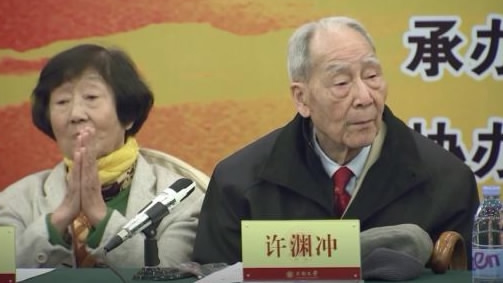
File photo of Xu Yuanchong (R), a well-known Chinese translator. (Photo/CGTN)
How would you translate Chairman Mao Zedong’s expression: “Bu Ai Hong Zhuang Ai Wu Zhuang”?
“English or American translators might use the words: They love uniforms not gay dresses,” said Xu Yuanchong, a well-known Chinese translator and the first Asian winner of the world's highest prize for translation, The Aurora Borealis Prize.
Xu thought that this translation was correct but not beautiful at all. He cleverly used just two words-“face” and “powder”-to translate it as “To face the powder and not to powder the face”, which became one of his pieces of translation work.
Xu argues that the equivalence of idea, sound and form are the three basic elements found in good translation.
However in some of his translations, his method-recreation instead of literal-is controversial.
“Some people might say that it is different from the original text,” a reporter suggested to him.
“I think not,” Xu replied firmly.
“Western languages are comparable. More than 90% of vocabularies can be similar. It’s easy to find the equivalent of English, in French and so on. But it’s different in Chinese. There are only 50% of equivalents between Chinese and English. So how about the rest?” Xu asked.
“In that case, if you cannot find an equivalent, then you must find the best words to translate. To find the best word is innovation, it’s recreation,” he explained.
Xu Yuanchong likes to communicate with the younger generation about academic work, hoping that collaborating to spread Chinese culture will contribute to making the world a better place.


















































